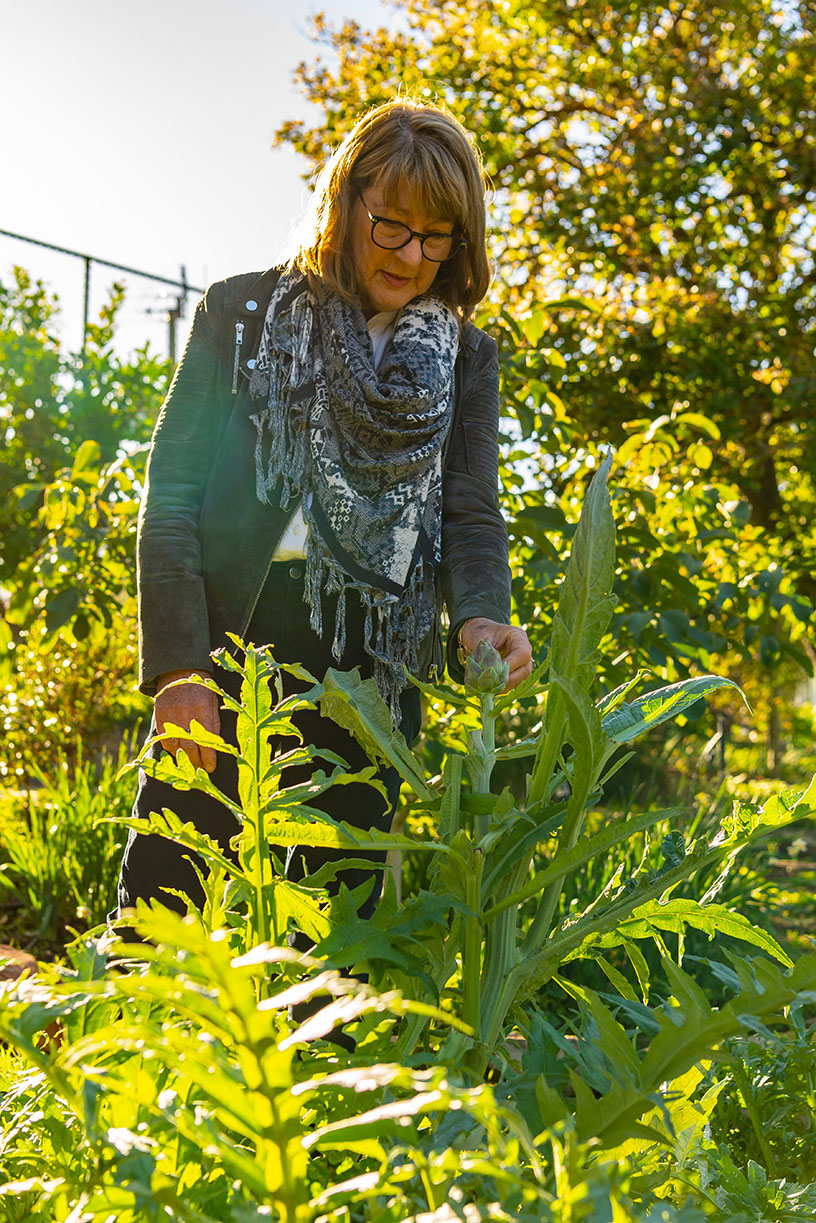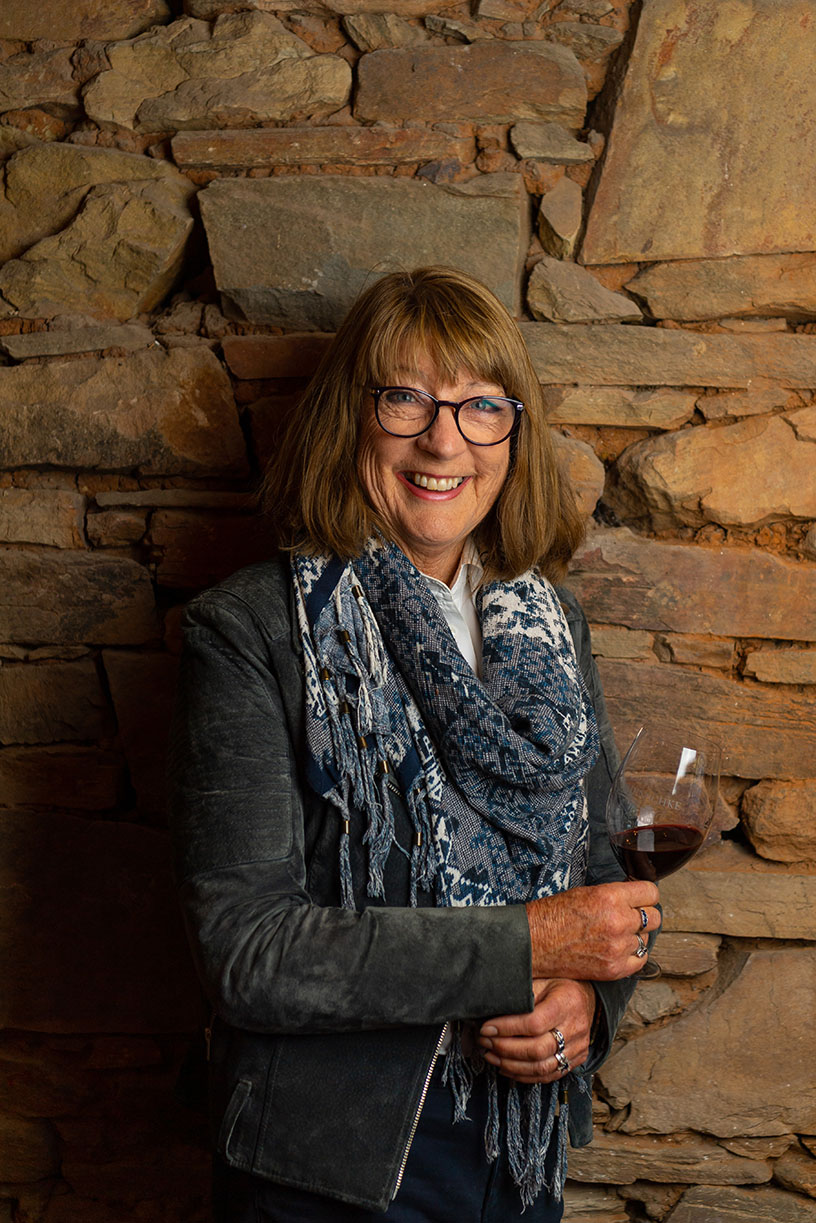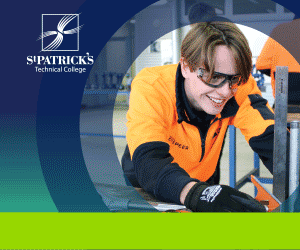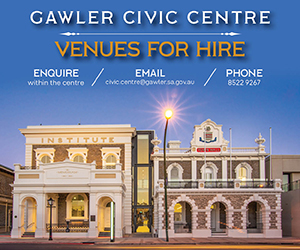Story
Prue’s garden of Eden
words Heidi HELBIG
PHOTOGRAPHY john krÜger

Cutting a striking figure in the boardroom of her cellar door, it’s hard to imagine just a few hours earlier Prue Henschke was knee-deep in the vineyard, the place where she is happiest.
“I love being in the vineyard,” says Prue simply. “It’s all about observation, because if you’re wanting to understand something, you have to observe it.”
Prue’s philosophy of living in the land – not on top of it – has helped make Henschke famous the world over, and has influenced her life’s work as a botanist, viticulturist and advocate for vine improvement.
She smiles at the suggestion she was an organic farmer long before it was commercially popular.
“It’s now called regenerative agriculture. When I read what people post on Facebook about what they’re doing, I think ‘so you should – you should have done that years ago’,” she laughs.
“But it’s very good for it to have a name now, because that means it’s easier to pass the idea on.”
She’s referring to a form of biodynamic farming – a way of caring for the land with minimal cultivation, where the created landscape sits in a healthy balance with the natural landscape.
“That goes back to my university days,” explains Prue. “I studied botany and zoology and I’ve always been passionate about the Australian landscape; it’s probably one of the most diverse landscapes in the world.
“Vineyards are perhaps too much of a monoculture; there’s a real lack of diversity.
“Now we’re understanding that the more biodiverse the vineyard, the healthier it is, with better soils and better pest control, which really stems from what we call ecosystem services.”
At the heart of Prue’s methodology is the role of native plants in a symbiotic relationship with the vines. She has championed native plants since the day she arrived at Henschke in Keyneton with her husband and fifth generation winemaker Stephen Henschke.
“It was really hard to know what to do,” says Prue. “We could copy the Europeans and put in water-thirsty cover crops, but I thought we’ve got an absolutely amazing selection of our own native plants growing around the place, in little pockets of bush.
“So I put a list together and selected what I thought we could grow within the vineyard and also around the vineyard.
“People are now beginning to understand that our native vegetation is not a competitor, has huge benefits for the vineyard and is more successful than rose bushes for example.
“I think it’s really exciting and that’s what you want – for other people to take your ideas on and benefit from them.”


Prue is also conscious of their shared responsibility as stewards of the Henschke properties, or in her words, “gardens”.
The gardens include over 30 hectares of native timber trees, 150 hectares of bushland under conservation and 100 hectares of vineyards.
In the Hill of Grace vineyard, the 160-year-old vines are among the oldest in the world, while the newest plantings in the Eden Valley vineyard are Spanish and Italian varieties, including the highly successful Tempranillo and Nebbiolo.
Their acquisition of an Adelaide Hills orchard saw Stephen diversify into pinot noir – “a variety he’s always dreamed of making” – which ignited in Prue a love for growing her own fruit, including heirloom Kentish cherries and gooseberries.
The native gardens around the cellar door are also testament to Prue’s green thumb.
“We’ve used native grasses and I’ve tried to protect the rarer plants – as a botanist I know what to look for,” says Prue.
“I mean, I haven’t ever stopped looking for plants really -– I find things on the roadsides and think, ‘that’s amazing’.”


“I think we’ve been able to tell a really good story about how we look after the land, and that’s really important to me”
- Prue Henschke
With over 150 years and seven generations of heritage, Prue and Stephen are creating a remarkable legacy for their children, Johann, Justine, Ruby and Andreas, all of whom work in the company in some capacity.
“There’s a lot of knowledge and history that we can pass on; it was a heartbreak for Stephen not to have his Dad around when he took over,” says Prue. “I think it was an empty space, not having that advice or being able to ask about the past; some of that history got lost.
“We are really here to mentor and work alongside them for as long as we can.”
This custodianship is what makes the Henschke brand greater than the sum of its parts.
“It’s a wonderful family business with amazing vineyards and a gorgeous cellar door, and we need to keep it going forward because it forms part of Australia’s history,” says Prue.
“I think we’ve been able to tell a really good story about how we look after the land, and that’s really important to me.”






